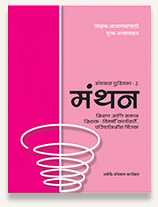
Manthan
Manthan, meaning churning, is a foundation course for pre-service teacher training. Despite occasional acknowledgement by the government of the need for reforms, teacher education in India has remained virtually unchanged since colonial times. Hence it still reflects the colonial view of the teacher as simply a transmitter of a set curriculum, where knowledge is a ‘given’ and the teacher becomes a mere transmitter of pre-selected content. Consequently, the emphasis has remained on pedagogy, on teaching methodologies, rather than on engaging the teacher actively in shaping the content of the curriculum to make it relevant and use it as a tool to achieve larger educational objectives.
Manthan seeks to find a space within the existing structure in order to begin the process of rethinking, instead of supplanting what already exists. Its approach is to supplement rather than replace the mainstream curriculum. Further, the course is to be conducted by ‘regular’ teacher educators (that is, those teaching in teacher education colleges) rather than by external agencies or other ‘experts’. This strategy, we believe, will make it possible for a larger number of institutions to introduce curricular changes; it would also make innovations more acceptable to teacher educators. In fact, the course also serves as a refresher module for them to be in line with the changes proposed in the system by recent legislations and policies.
Above all it focuses on the teacher’s role as mediating agent between learners, school and society. The main purpose behind the course is to underline the interplay between socio-political-environmental issues and education. Educational systems create new knowledge that drives society. It is therefore important for teachers to understand and analyze how and why socio-political institutions function in a certain way. This preparation will help the teachers to reflect on the content of school subjects in a critical manner. It is hoped that an emerging generation of empowered reflective teachers will help create classrooms with independent thinkers and decision makers who will be able to address the manifold problems facing us today.
Manthan helps teacher educators and student teachers examine the way the education system functions in our country, critically assess the role of some of the main ‘actors’ in the schooling process (teachers, learners, government and the larger society), evaluate the social and political agenda of education, and understand the importance of analyzing both what is taught and how it is taught in school. It is intended to provide an opportunity for trainees to see the school as part of the larger society.
Most of us would agree that formal education has a key role to play in bringing about any kind of lasting change in our society. The cutting-edge scientific, technological and other professional expertise that our country is so rightly proud of, has for its foundation a solid school system, largely State-funded. We know that it also plays a significant role in empowering hitherto marginalized groups to participate in social and political institutions. And today, even the poorest Indian looks to school education as the single most important factor in transforming her life from one of poverty and inequity to one of relative dignity. Hence it is imperative that we discuss how we can use the school curriculum as a tool for social transformation.
The course is based on certain fundamental values that we consider essential for a democratic society:
- Equality of all human beings
- Recognition of individual freedoms
- Appreciation of pluralism and diversity of all kinds
- Representation of and participation by everyone in the decision-making process
- Use of dialogue and discussion as the primary means to resolve contentious issues.
These are also the values that are enshrined in our Constitution. The hope is that these values will be internalized by the student teachers, who in turn will strengthen these values among their students – our future citizens.
The Manthan curriculum
The course content covers two of the three curricular areas prescribed by the National Council of Teacher Education – namely, Foundations of Education and Curriculum and Pedagogy. The course consists of fifty sessions in all, with twenty-five sessions to be conducted each year. The two kits each contain a Teachers’ Manual and all required visual materials.
YEAR ONE

The themes covered in Year One focus on the fundamentals of education. The sessions look at the some of the players in the field of education, their roles and the impact that they have, as well as the ways in which we learn. They go on to explore the history of education in India, and finally discuss Curriculum, Methodology, and Assessment in greater detail.
Read MoreYEAR TWO

Based on the fundamentals explored in Year One, the curriculum of Year Two focuses on issues that affect our society. Complex issues such as caste, class, gender, nationalism, and the environment are discussed and deconstructed. The aim is to locate education in the wider context of society, and to examine the role of teachers within the social system.
Read MorePROCURING Manthan KITS
The two-kit Manthan series is available for use by individuals / organizations working with trainee teachers. Please contact us for further details.
AVEHI ABACUS PROJECT
Second Floor, K.K. Marg Municipal School,
Saat Rasta, Mahalaxmi,
Mumbai 400 011.
Tel: +91-22-23075231
+91-22-23052790
e-Mail: avehiabacus@gmail.com
YEAR ONE
The themes covered in Year One focus on the fundamentals of education. The sessions look at the some of the players in the field of education, their roles and the impact that they have, as well as the ways in which we learn. They go on to explore the history of education in India, and finally discuss Curriculum, Methodology, and Assessment in greater detail.
The sessions in the first year are divided into five modules:
- The Teacher: Playing Many Roles
- The Child: Special in Different Ways
- Learning: Thinkers and Theories
- Education in India: A Story of Continuity and Change
- Education in India: Curriculum, Methodology, Assessment
YEAR TWO
Based on the fundamentals explored in Year One, the curriculum of Year Two focuses on understanding our society and how it is reflected in our education system. Complex issues such as caste, class, gender, nationalism, and the environment are discussed and deconstructed. The aim is to locate learning in the wider context of society, and to examine the role of teachers within the social system.
The sessions in the second year are divided into three modules:
- School is society - understanding how school is a reflection of society.
- Education and society - understanding the link between education and society. Topics of current concern - such as inequalities of gender, caste and class; communalism, nationalism, war and violence; influence of the media; issues related to development and the environment - are taken up for systematic discussion and analysis. An attempt is also made to show how, if at all, they are handled in the school syllabus and in teaching materials, such as textbooks.
- Reflective thinkers and Transformative Intellectuals - motivating teachers to critically examine their role within the system; encouraging them to see themselves as reflective thinkers and transformative intellectuals rather than merely conduits of information.
